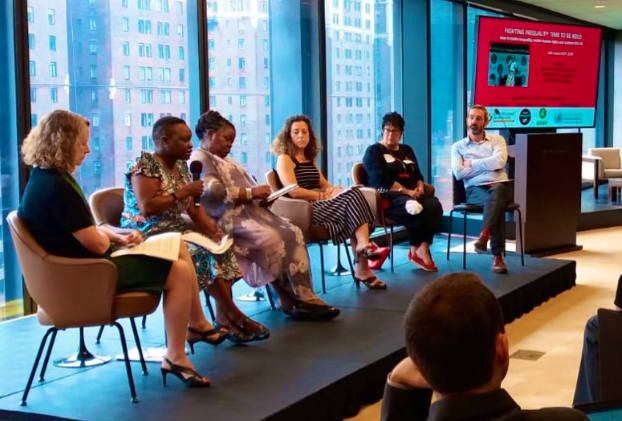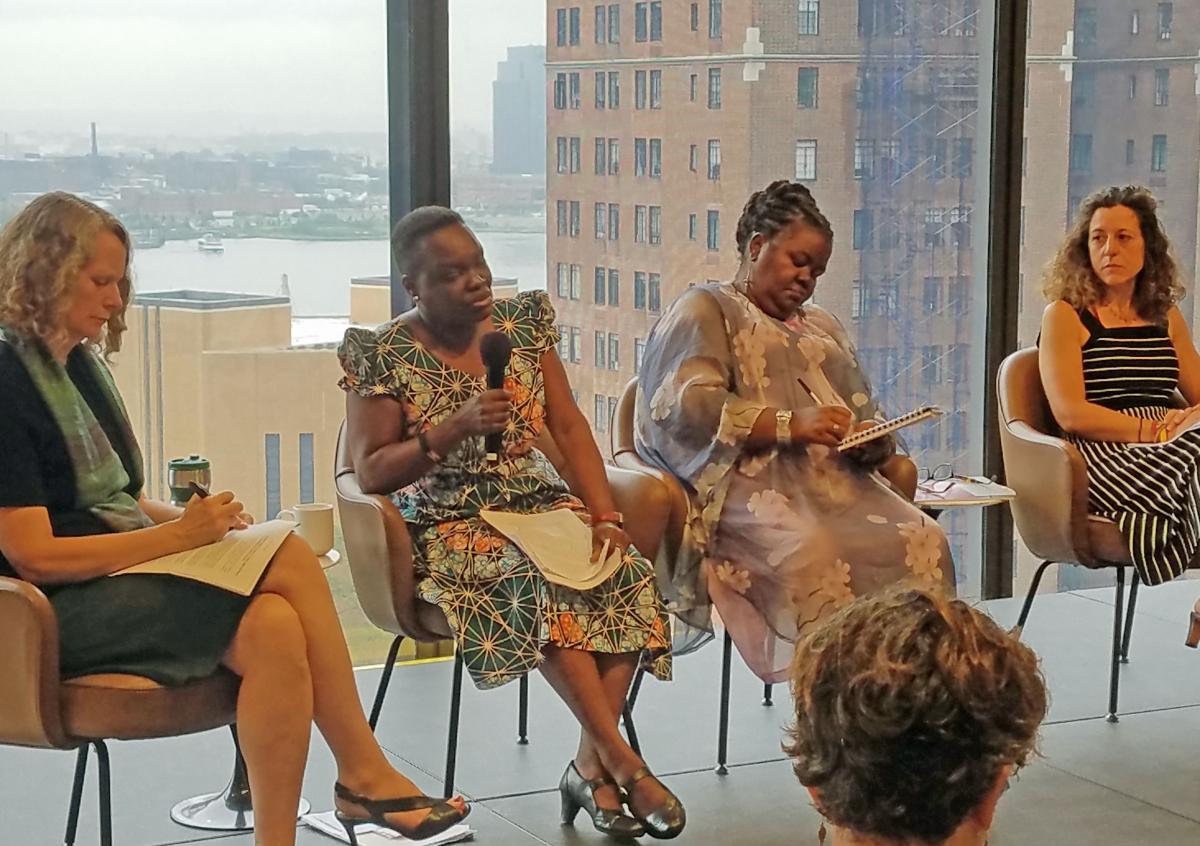July 30, 2019
“The power of the people is stronger than the people in power.”
—Njoki Njehu, Fight Inequality Alliance
Stark power imbalances are fueling extreme global inequality and the sustained pressure of cross-movement alliances within civil society and beyond are crucial for combatting the problem. These were central themes in a dynamic discussion that took place before a capacity crowd on July 18th at the Ford Foundation Center for Social Justice, an event co-organized by the Center for Economic and Social Rights (CESR), Fight Inequality Alliance (FIA) and Oxfam.

Held on the fringes of the UN’s High-Level Political Forum for Sustainable Development (HLPF), and in many ways a counterpoint to the official discussions taking place nearby, “Time to be Bold. How to Tackle Inequality, Realize Human Rights and Achieve SDG 10” centered civil society voices and their strategic analyses of the real nature of the inequality problem, and what strategies and remedies are sorely necessary – beyond technocratic tinkering.
Co-sponsored by OHCHR, Public Services International (PSI) and the Independent Commission for the Reform of International Corporate Taxation (ICRICT), the panelists drew from their varied experiences as researchers, activists, organizers and advocates at different levels and in diverse contexts. Ignacio Saiz, Executive Director, CESR, moderated the panel, which included: Peggy Hicks, OHCHR; Njoki Njehu, Fight Inequality Aliance; Chiara Mariotti, Oxfam; Irene Ovonji Odida, ICRICT Commissioner; and Rosa Pavanelli, Public Services International.
The event kicked off with a powerful video from FIA – one of a series showing activists fighting inequality in its many forms, in various countries. Ignacio Saiz introduced the discussion by recalling the significant achievement represented by the inclusion of Goal 10 (reduce inequalities within and among countries) in the Sustainable Development Goals, one which was largely brought about by civil society pressure.
However: “Four years on, these pledges are beginning to ring hollow. We’re seeing very little evidence of the political will needed to implement them,” said Ignacio Saiz. He noted that since 2015, global wealth concentration has escalated and “fiscal policies in most countries reflect the dogma of austerity rather than the duty to redistribute.” Simultaneously, an increasing number of authoritarian governments are institutionalizing discriminatory laws and practices against women, racialized groups, migrants and LGBTQ people.
Powerful vested interests, elite and corporate capture of governments were all viewed as daunting barriers to progressive change. Speakers agreed that we have to go beyond a preoccupation with redistributing income and wealth, to focus on redistributing power. “We need to understand that wealth doesn’t just equal money. It equals power, impunity and influence” said Njoki Njehu, and our tactics have to be keenly informed by this recognition.
 The keen awareness that all dimensions of this issue are deeply political ran through the discussion. As Irene Ovonji-Odida observed for example, “tax isn’t just a technical issue…it’s about power.” Exacerbating this, speakers acknowledged that the multilateral system is “in deep crisis,” and global governance is still controlled by the rich elite (i.e. the richest countries and the richest individuals). As evidence, Rosa Pavanelli criticized a recent agreement between the UN and the World Economic Forum, that seems to further the access and influence of large corporations. The democratic deficits in the Organisation for Economic Cooperation and Development’s (OECD) global norm-setting on tax were raised by Irene Ovonji Odida as a clear example of undemocratic economic governance, with developing countries denied an equal seat at the table to discuss an issue which gravely impacts them.
The keen awareness that all dimensions of this issue are deeply political ran through the discussion. As Irene Ovonji-Odida observed for example, “tax isn’t just a technical issue…it’s about power.” Exacerbating this, speakers acknowledged that the multilateral system is “in deep crisis,” and global governance is still controlled by the rich elite (i.e. the richest countries and the richest individuals). As evidence, Rosa Pavanelli criticized a recent agreement between the UN and the World Economic Forum, that seems to further the access and influence of large corporations. The democratic deficits in the Organisation for Economic Cooperation and Development’s (OECD) global norm-setting on tax were raised by Irene Ovonji Odida as a clear example of undemocratic economic governance, with developing countries denied an equal seat at the table to discuss an issue which gravely impacts them. The ongoing closure of civic space and crackdowns on human rights and environmental defenders were pointed out as prominent obstacles to identifying, discussing and eradicating the systemic roots of inequality. As Peggy Hicks insisted, it is essential to protect civic space and the freedoms of association, assembly and expression if we want to challenge inequality.
Some of obstacles highlighted were more technical in nature, but also reflected power imbalances and blindspots. For example, Chiara Mariotti raised the deficiencies of the monitoring system for SDG10, which does not capture important dimensions of the inequality crisis and is not measuring performance in the policies that are needed to tackle inequality. Similarly, the lack of concerted and coordinated leadership from the UN was cited as a problem.

The speakers did note some existing areas of hope and progress to build on, for example:
•The very existence of SDG10, plus the SDG target on illicit financial flows (16.4);
•Many more people coming to understand tax as an issue that affects their lives
•Growing engagement of different movements in the fight against extreme inequality and its drivers, e.g., human rights, labor, youth and women’s rights groups, mobilized through FIA and other spaces;
•Creative activism at the national and local levels, e.g. budget advocacy in Kenya, which highlighted the fact that VAT was waived on helicopter spare parts, but not on school textbooks;
•The recent adoption of ILO Convention 190 on violence and harassment in the workplace;
•Improvements in data collection, which can shine a light on long-invisible aspects of inequality; with technology being noted as an opportunity as well as a risk.
Focusing on progressive tax reform (and the powers holding it back) and tackling corporate tax avoidance and illicit financial flows were upheld as concrete remedies for inequality. Proactive policies such as investing in universal public services like health, education, water and sanitation, and fighting for labor rights and living wages were also highlighted, with cross-movement mobilization necessary to propel these reforms forward.
Nevertheless, speakers agreed that given the stark power imbalances involved, advocates must go beyond proposing policy changes, and wage the battle on multiple fronts: from the halls of the UN, to the boardrooms of multinational corporations, to the streets of cities and towns and villages. The importance of civil society understanding and foregrounding intersecting forms of inequality, along lines of race, gender, class and more was stressed, as was the need for feminist analysis and leadership.
Power also needs to be shifted within our own movements; as Njoki Njehu said, “The struggle must be led by people on the frontlines of inequality.” To these ends, communication should be enhanced by civil society organizations discarding alienating jargon (“kizungu mingi” in the Swahili term). Explicitly naming those institutions or individuals who perpetuate unequal systems, “speaking truth to power” and building the political will for major policy shifts as opposed to incremental changes were also posed as bold and necessary solutions. Connecting different parts of the struggle through solidarity between big and small NGOs, and social movements was seen as an urgent step, so that collective impact from here can begin to better match the scale of the challenge.
Top left photo courtesy of Katherine Robinson: Panelists from "Time to Be Bold: How to Tackle Inequality, Realize Human Rights and Achieve SDG 10” include (left to right) Peggy Hicks, OHCHR; Irene Ovonji Odida, ICRICT; Njoki Njehu, FIA; Chiara Mariotti, Oxfam; Rosa Pavanelli, PSI; Ignacio Saiz, CESR (moderator).
Related: